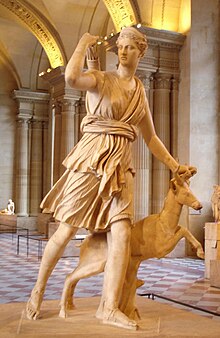Artemis Persica
| Artemis | |
|---|---|
| Goddess of the hunt, forests and hills, the moon, and archery | |

|
|
| Abode | Mount Olympus |
| Symbol | Bow, arrows, stags, hunting dog, and moon |
| Personal information | |
| Parents | Zeus and Leto |
| Siblings | Apollo, Aeacus, Angelos, Aphrodite, Ares, Athena, Dionysus, Eileithyia, Enyo, Eris, Ersa, Hebe, Helen of Troy, Hephaestus, Heracles, Hermes, Minos, Pandia, Persephone, Perseus, Rhadamanthus, the Graces, the Horae, the Litae, the Muses, the Moirai |
| Roman equivalent | Diana |
Artemis (/ˈɑːrtɪmɪs/; Greek: Ἄρτεμις Artemis, Attic Greek: [ár.te.mis]) was one of the most widely venerated of the Ancient Greek deities. Her Roman equivalent is Diana. Some scholars believe that the name, and indeed the goddess herself, was originally pre-Greek. Homer refers to her as Artemis Agrotera, Potnia Theron: "Artemis of the wildland, Mistress of Animals". The Arcadians believed she was the daughter of Demeter.
In the classical period of Greek mythology, Artemis was often described as the daughter of Zeus and Leto, and the twin sister of Apollo. She was the Hellenic goddess of the hunt, wild animals, wilderness, childbirth, virginity and protector of young girls, bringing and relieving disease in women; she often was depicted as a huntress carrying a bow and arrows. The deer and the cypress were sacred to her. In later Hellenistic times, she even assumed the ancient role of Eileithyia in aiding childbirth.
The name Artemis (noun, feminine) is of unknown or uncertain etymology, although various ones have been proposed.
...
Wikipedia
